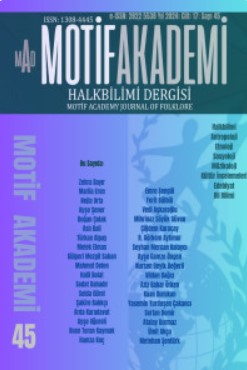BİR ŞİİR MECMUASINDAN HAREKETLE DERZİ-ZÂDE ULVÎʼNİN YAYIMLANMAMIŞ BİR GAZELİ
AN UNPUBLISHED POEM BELONGING DERZİ-ZÂDE ULVÎ, FOUND IN A POETRY MAGAZINE
Author(s): Ferit BÜLBÜL, Emre ŞENGÜL, Hamza KOÇSubject(s): Poetry, Turkish Literature, 16th Century, The Ottoman Empire
Published by: Motif Halk Oyunları Eğitim ve Öğretim Vakfı
Keywords: 16th Century; Derzi-zâde Ulvî; poetry magazine; divan; unpublished gazel;
Summary/Abstract: Little is known about the [Ottoman] poet Derzî-zâde Ulvî, including when he was born, beyond that his original was Mehmed. Moreover, scant bibliographic sources tell us that he most likely was from Istanbul. He had a brother, Mustafa Çelebi, who like him, composed poetry in the Re’yî style, thus implying that Ulvî was reared in a literary milieu. A huge turning point in Ulvî’s life was when he moved to Manisa and began studying the sciences under Muallim-zâde Ahmed Efendi, the province’s mufti. At around the same period, he was presented to Sultan Süleyman the Magnificent’s son Selim II (then a prince) by Celal Bey and Turak Çelebi, with their high praise (they were good friends with the royals). Ulvî would end up writing several odes for Selim, and upon gaining his favour, gradually earned himself a name as one of the 16th century’s most distinguished poets both in the literary and scholarly sense. Unfortunately, Çelebi’s execution by order of the Sultan threw Ulvî into financially and morally troublesome times for a while. He expressed his grief over the incident in a poem that would end up rubbing the Sultan the wrong way, who in response issued a warrant for his imprisonment and death. As a result, Ulvî went into hiding, and wouldn’t resurface and return to Istanbul until Selim II took the throne. When he did, he apprenticed under Mehmed Vusûlî Efendi (aka Hubbî Mollası). Alas, Ulvî was heavy drinker, and died in poverty in Istanbul in 993/1585 at the hands of his habit. Nevertheless, in his lifetime he left behind two books, Divan (his magnum opus) and Manisa Şehrengizi, plus countless works of prose scattered across multiple poetry magazines – all of which are characterized by a distinctly rich, fluent, and yet plain literary style, and collectively represent a valuable cultural treasure trove. Similarly, non-Divan poetry, regardless of who the poet is, further reflect people’s literary taste around that era. In this study, we want to focus one gazel of Ulvî’s (he wrote three in total) that made its way in a poetry magazine (Yapı Kredi Research Library – Y 0431) rather than Divan. We shall examine its form and content, debate why we think it belongs to Ulvî, and then provide a transliteration and Modern Turkish translation.
Journal: Motif Akademi Halkbilimi Dergisi
- Issue Year: 17/2024
- Issue No: 45
- Page Range: 243-253
- Page Count: 11
- Language: Turkish

